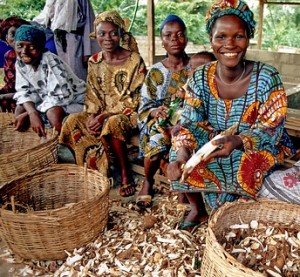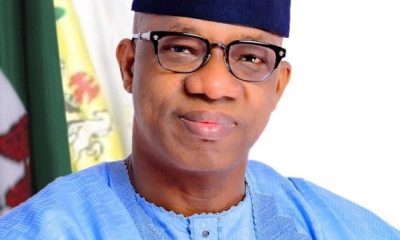Agriculture
Akinwumi Adesina Strikes Again!

By Femi Adesina
Anytime he traverses the land, air or sea like a troubadour, he must bring good tidings. Each time the Nigerian President of the African Development Bank (AfDB) comes to see President Muhammadu Buhari, he never comes empty handed. He must bring goodies and goodies for his home country.
Tuesday, last week was not different. Dr Akinwumi Adesina, former Minister of Agriculture, came on a proactive rescue mission. Something was severely threatening food security in Africa, and Nigeria particularly. It calls for urgent action.
Each time the two gentlemen meet, they start with banters. So comfortable are they in each other’s company.
The jokes and bonhomie over, the AfDB President burst the speaker: “Urgent actions are needed to prevent a food crisis in Africa.”
Why? How? When? What can be done? The questions came tumbling out, like water cascading from a burst dam.
Dr Adesina provided all the answers.
“I am here Mr President to brief you on the impacts of the Russian-Ukraine war and its implications for food security in Africa, and Nigeria; and to intimate you with decisive actions being taken by the African Development Bank to avert what is a looming food crisis.”
“Russia and Ukraine dominate export of wheat and maize to Africa. With the disruption of supplies arising from the war, Africa now faces a shortage of at least 30 million metric tons of food imports from Russia and Ukraine, especially for wheat, maize, and soybeans.”
As the man spoke, suddenly Russia and Ukraine were not so faraway again. They were right there in the Diplomatic Room of the Presidential Villa.
More statistics: “Price of wheat has soared in Africa by over 45% since the war. Prices of fertilizers have gone up by 300%, and the continent faces a fertilizer shortage of 2 million metric tons. If unmet rapidly, food production in Africa will decline by 20%, and the continent would lose over $11 billion in value of food production.”
Holy Moses!
The AfDB boss quoted the UN Secretary-General, Antonio Guterres, who had said: “We are now facing a perfect storm that threatens the economies of developing countries.”
If there’s anything President Buhari is concerned about, it is that Nigerians should be able to feed themselves, without recourse to massive food importation. That was why he encouraged us to return to the land, put his money where his mouth is by funding agriculture massively, and today, we have a lot to be thankful for. Food security is almost a reality in the country.
But because the world is now a global village, and no nation is an island, the Russian-Ukraine war could still affect some fundamentals of our food security. So, what to do? Fortunately, we have our own ‘export’ to the world at the AfDB. He unfolded what he has in store for Africa, and for Nigeria, our own dear native land.
“Mr President, I know that you are also worried about the effects on Nigeria…The African Development Bank, under my leadership, is fully prepared to meet this new challenge head on. The Bank has developed a $1.5 billion Africa Emergency Food Production Plan to support countries to produce food rapidly, to mitigate the effects of the war on food prices.
“The plan will support countries to produce 38 million metric tons of food. This will include 11 million metric tons of wheat; 18 million metric tons of maize; 6 million metric tons of rice; and 2.5 million metric tons of soybeans.
“The total value of the additional food production is $12 billion. This plan, which is before the Board of Directors of the Bank for its approval, will be rolled out by the end of May and will cover all countries of the Bank.”
What is in it for me, that is the question people often ask. What’s in it specifically for Nigeria?
“Nigeria is top priority under the emergency food production plan. For the wet season of 2022, the plan will support 5 million smallholder farmers in Nigeria. They will cultivate 2.5 million hectares: one million hectares for maize; one million hectares for rice; 250,000 hectares for soybeans; and 250,000 hectares for sorghum.
“For the dry season of 2022/2023, the plan will support one million farmers across 10 northern states. We expect that this will support 500,000 hectares of wheat. Overall, the Emergency Food Production Plan for Nigeria will produce 9.5 million metric tons of food.”
Call this being proactive, or preparing adequately for the rainy day, and you are right on the money. Since 2015, President Buhari had seen into the future, repositioned the agriculture sector in the country, and he is now receiving viable support from outside. Support that won’t end up in private pockets. God bless leaders who care for their people, particularly the weak and vulnerable.
Dr Adesina said the AfDB will also support Nigeria to develop Special Agro-Industrial Processing Zones.
“We have helped to mobilize $540 million for the program. The African Development Bank has approved a total of $210 million. The Islamic Development Bank, and the International Fund for Agricultural Development (IFAD) have approved $170 million, and $160 million respectively, towards the program.”
The Special Agro-Industrial Processing Zones will be initially rolled out in 7 States: Kano, Ogun, Oyo, Kaduna, Kwara, Imo, Cross River, and the Federal Capital Territory.
Dr Adesina ended on a note of hope. “Dear Mr President, you are passionate about agriculture. Your passion is shared by me and the colleagues at the African Development Bank. What is needful now is rapid action by Nigeria to implement the program to further boost food production, reduce food price inflation, and transform the agriculture sector, while assuring food security, and creating jobs. Your leadership will be critical for success. Failure is not an option. The farmers are waiting.”
A delighted President Buhari thanked Dr Adesina profusely, encouraging him to work with the right Ministers back here, adding that Nigerian borders were closed for about two years to protect local farmers, and curb smuggling. “We made some progress,” he added.
For those who look at only the downsides of things, under President Buhari, we can be thankful to God that we can feed ourselves, and not crossing the borders to look for food. All other things shall soon be added to us.
Amen, somebody!
*Adesina is Special Adviser to President Buhari on Media and Publicity
Agriculture
Olam Agri Partners with SCAAD to Empower Women in Benue, Nasarawa

From Attah Ede, Makurdi
Olam Agri, in partnership with Sustainable Collective Advocacy for Africa Development (SCAAD) Initiative, is to launch the Community Resilience Opportunities for Women and Youth (CROWY) in Benue and Nasarawa States.
A press release by Elizabeth Nnoko Communication Manager, Olam Agri, said the CROWY Project is aimed at creating lasting positive change for women and youth across Nigeria’s North-Central region.
The Project ground-breaking initiative is designed to empower grassroots women and youth farmers, aligning with national development and gender equality objectives.
The project also, aims to strengthen livelihoods during off-farming seasons by equipping beneficiaries with strategic leadership skills, entrepreneurship training, and increased awareness on inclusion, gender equality, and early warning signs and systems related to Gender-Based Violence (GBV).
Delivered in collaboration with Rich-Oak Life Initiative, Sahel International Support Foundation, and Elikizi Foundation for Women and Youth Advancement, the CROWY Project seeks to close critical economic gaps by providing inclusive livelihood opportunities, access to cooperative financing, and leadership support for emerging women and youth-led enterprises.
“We aim to create 10 Village Savings and Loan Associations and support 100 of women and youth entrepreneurs within the first year in the fields of tailoring, baking amongst others.
“This intervention will expand economic opportunities, promote self-employment, and build sustainable and resilient livelihoods across the targeted communities.
“Across Nigeria, women, youth, and persons with disabilities continue to face systemic barriers to education, livelihoods, and leadership pathways. Recent statistics highlight the urgency of this challenge.
“In 2023, women’s labour force participation stood at just over 52%, down from nearly 57% in 2010 (Statista, 2023). Youth unemployment remains critically high, with 53% of Nigerians aged 15–24 unemployed or underemployed (World Bank, 2024).
“According to Nigeria’s Minister of Women Affairs, as of October 2025, approximately 70% of Nigerian women live in extreme poverty, unable to meet basic needs or sustain livelihoods
“These figures paint a stark picture of structural inequalities that continue to undermine national development and social stability”, the statement said.
On the part of SCAAD initiative, a Statement by Frances Okeke, Executive Director, stated that “Every day, we meet women and young people with immense creativity and resilience, yet without the support they need to thrive truly. Nigeria’s overlapping crises have made survival even harder for them, especially in farming communities where off-season periods often deepen economic vulnerability.
Okeke maintained the through the support of Olam Agri, the CROWY Project is stepping into this gap, offering practical skills, livelihood opportunities, and hope to grassroots women and youth.
Said he, “Together, we are equipping individuals not only to earn a living during non-farming seasons but also to lead, innovate, and uplift their communities. When women and young people are given the tools to succeed, entire communities become more resilient and rise with them.”
While Anil Nair, Country Head Olam Agri Nigeria added, “Our partnership with SCAAD Initiative on the CROWY Project reinforces our shared vision of resilient, empowered, and economically active communities. Women and youth are central to the future of agriculture in Nigeria and supporting them through targeted skills development and inclusive financing is essential for long-term national growth.
“Olam Agri will continue to champion initiatives that uplift vulnerable groups and strengthen the fabric of our communities.”
“Olam Agri and SCAAD Initiative invite government agencies, community leaders, NGOs, and development partners to join in supporting inclusive livelihood strategies. Collaboration is vital to building resilient, equitable communities.
“The partnership is committed catalyze efforts to enhance economic opportunities, promote self-employment, and build sustainable livelihoods for women and youth in conflict-affected communities”.
Agriculture
FG Tasks Africans on Sheep, Goat Plague Eradication

The Federal Government said African countries must shift from reactive, event-driven responses to predictive, risk-based and analytics-driven surveillance to meet the global target of Peste des Petits Ruminants (PPR) disease eradication by 2030.
PPR is a viral disease caused by morbillivirus closely related to rinderpest virus which affects goats, sheep and wild relatives of domesticated small ruminants and camels.
Permanent Secretary, Federal Ministry of Livestock Development, Dr.
Chinyere Akujobi said this in Abuja on Wednesday at the Regional Training on Strengthening Animal Disease Surveillance, Building Capacities for PPR Eradication and Trans-boundary Animal Diseases.The training was under the Framework of Implementation of the Pan-African PPR Eradication and other Sheep and Goat Disease Control Programme in West African Member Countries.
It was organised by the Food and Agriculture Organisation of the United Nations (FAO) in collaboration with the African Union-Interafrican Bureau for Animal Resources (AU-IBAR) with financial support from the European Union.
Akujobi urged every country to build surveillance systems that were smarter, faster and more collaborative.
She further urged strengthening coordination, adoption of modern tools and ensuring information-driven action.
“We must build stronger technical skills in participatory and risk-based surveillance; harmonise epidemiological procedures so that data generated across countries can be compared and acted upon.
“We must adopt modern tools for defining epi-systems, map high-risk zones and integrate these results into continental and global platforms and strengthen regional coordination structures and the Regional Veterinary Committee.
“These priorities speak directly to the core challenges of our region, uneven reporting, weak linkages between laboratories and field surveillance, fragmented information systems and gaps in cross-border coordination,” she said.
She said the presence of participants at the workshop demonstrated the collective commitment of the region in tackling diseases that continued to undermine livestock productivity, livelihoods and regional integration.
Akujobi urged the participants to approach the sessions with an evidence-driven mindset that reflected the complexity of today’s trans-boundary animal disease landscape.
“Our surveillance systems must be guided by real-time information and must incorporate digital tools that enable us to detect risks early and intervene quickly.
“At the same time, our countries must work in harmony, because a disease like PPR does not recognise administrative boundaries.
“It is essential that our systems speak to one another and that information flows seamlessly from community animal health workers to national databases and onward to regional and global systems.
“This gathering is more than a routine training session; it represents a strategic turning point for West Africa,” she said.
According to her, many African countries remain heavily affected by PPR, Foot and Mouth Disease, African Swine Fever, Anthrax, Highly Pathogenic Avien Influenza (HPAI) among other trans-boundary and zoonotic diseases that threaten food security.
“The small ruminant sector, in particular, supports millions of families, including women and youth whose livelihoods depend on healthy animals.
“Every outbreak that sweeps through our communities deepens vulnerability and disrupts social and economic stability,” she said.
She assured that Nigeria remained fully committed to regional solidarity and to the Pan-African PPR Eradication Programme.
Akujobi said the country was focused on strengthening the National Animal Disease Information System to improve reporting from across the federation, enhanced laboratory–field collaboration under the One Health approach.
According to her, Nigeria works closely with ECOWAS, AU-IBAR, FAO and World Organisation for Animal Health to align national actions with continental strategies.
The training targeted veterinarians, laboratory scientists, epidemiologists, wildlife experts, border authorities and pastoralist communities across West Africa.
Its goal was to strengthen national and regional systems to enable them to be better equipped to eradicate PPR.
Agriculture
FG Empowers 9,870 Farmers with Inputs, Modern Rice Technologies in Kano

The Federal Government, through the Kano State Special Agro-Processing Zone (SAPZ) Programme in partnership with IFAD, has empowered 9,870 rice farmers in Kano with climate-resilient inputs and modern rice production technologies.
This was contained in a statement issued by the SAPZ Knowledge Management and Communication Officer, Rabi Mustapha.
The State Project Coordinator, Aminu Iliyasu, disclosed this on Sunday during the Farmers Field Day at Chiromawa Garin Babba Cluster in Garun Malam Local Government Area.
He said the exercise was organised to expose the farmers to Science-based and practical solutions capable of enhancing yields, improving food security, and boosting rural livelihoods.
Iliyasu described the field day as a celebration of knowledge, innovation and the resilience of smallholder farmers.
He explained that the SAPZ initiative in Kano aimed to expand access to improved technologies, strengthen extension services, reduce post-harvest losses and create market opportunities for rural farmers.
“These innovations are not theoretical. They are practical solutions that farmers can adopt immediately to raise productivity and increase income,” he said, while commending the support of local authorities.
Mustapha said the inputs distributed to 9,870 farmers included FARO 44 improved seeds, Urea and NPK fertilizers, and insecticides, targeting beneficiaries in Garun Malam, Gezawa, Bichi and Bagwai LGAs during the 2025 wet season.
She added that experts trained farmers on soil selection, seed dressing, nursery establishment, land preparation, and timely transplanting at proper spacing.
“They also covered fertilizer management, weed control, Integrated Pest Management and water regulation to boost rice yields.
“The training emphasised harvesting at optimal maturity, drying paddy to safe moisture levels, and fumigation using phostoxin to prevent storage losses,” she stated.
A beneficiary, Salamatu Ali, said the intervention had positioned Kano farmers to boost yields, withstand climate pressures and increase household incomes.
Another farmer, Huwaila Ibrahim, said the programme transformed her approach to rice production.
“Before, we planted without checking whether the land was suitable.
“Now, we first assess the soil to ensure it matches the seed variety. This season, we cultivated FARO 44,” she said.
Ibrahim added that her output increased from 20–25 bags per acre to about 40 bags after adopting the improved technologies.






























